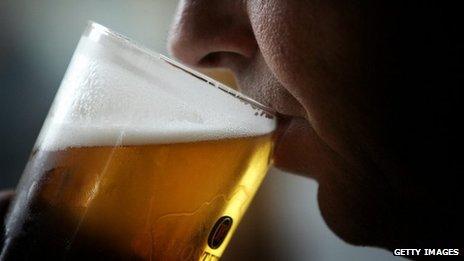Alcohol Concern Cymru fears for over-60s turning to drink
- Published

Adjusting to retirement could lead some people to turn to drink
A charity working with victims of alcohol abuse says it is worried how many over-60s are referred for treatment for drink-related problems.
Alcohol Concern Cymru called it a "hidden problem" and urged more help.
In April to June last year, 342 people aged 60 or over were referred for alcohol misuse, compared with 292 in the same period in 2012.
The Welsh government said it was improving access to substance misuse treatment.
Latest available figures from the Welsh National Database for Substance Misuse, external show that 1,072 people over 60 were referred to alcohol agencies in 2011-12. So far, the figure for 2012-13 is 987.
Health problems
However, Alcohol Concern Cymru says the extent of the "hidden" problem is not clear.
Andrew Misell, the charity's director in Wales, said: "It's very easy to point the finger at young people drinking.
"Under-age drinkers often drink in public spaces because they cannot get into pubs. That kind of drinking - that you might see in Cardiff or Swansea, or any other city on a Saturday night - is very obvious.
"But older people drinking isn't so obvious, and isn't generally linked to public or anti-social behaviour.
"When you are talking about drinking amongst older people you have got a range right through from people in their 60s, who are probably still at work and maybe have got into the habit of drinking after work, right through to people in their 70s and 80s.
"They might be experiencing some of the difficulties of coming to older age, such as adjusting to retirement, possibly the passing away of partners or friends, or health problems such as poor sleep, and alcohol might be seen as a very easily accessed self-medication.
'Disrespectful'
"I think we're realising more and more than we need different approaches.
"There is a bit of an issue that drug and alcohol services are seen as for young people and older people are perhaps more reluctant to access them.
"I know some services have looked at getting older staff on board because some people don't like to discuss it with people in their 20s."
He said some staff might also find it difficult to ask older people about their drinking because it "might be seen as disrespectful".
Rhian Pearce, of Age Cymru, said alcohol tolerance diminishes with age.
Depression
She added: "Older people are also more likely to be taking one or more prescribed medications, which can interact badly with alcohol in the body.
"Also, remember that some cough remedies contain alcohol.
"Excessive alcohol consumption can also increase the risk of falls and accidents, worsen existing health problems, and also cause anxiety, confusion and depression.
"Some older people drink alcohol because they mistakenly believe it will warm them up. However, alcohol actually cools the body down."
Prof Ilana Crome, of Keele University, looked at substance misuse in older people for the Royal College of Psychiatrists.
"What we suggest, with the support of some American colleagues at this point, is that older people, if they are healthy, should not drink more than one and a half units a day and no more than 11 units of alcohol a week," she told BBC Radio Wales.
The Welsh government has launched a working group "to specifically oversee the development of guidance to improve access to substance misuse treatment for those aged 50 and older".
A spokesperson added: "The group consists of a wide range of stakeholders and the guidance will be out for a 12-week consultation period later this month.
"In addition, as part of its forward work programme, the Advisory Panel on Substance Misuse has agreed to provide advice on the issues to be taken into consideration and the policy interventions necessary to tackle substance misuse in an ageing population."
- Published4 February 2014
- Published17 December 2013
- Published7 September 2012
- Published25 May 2011